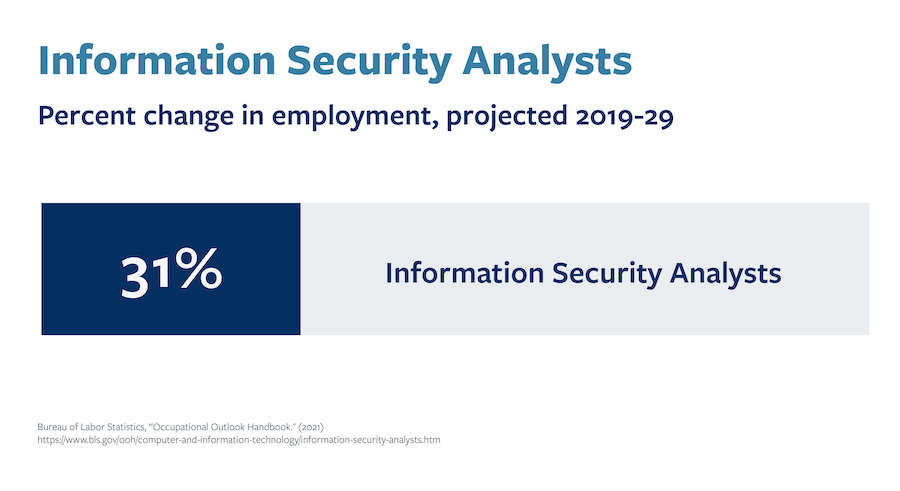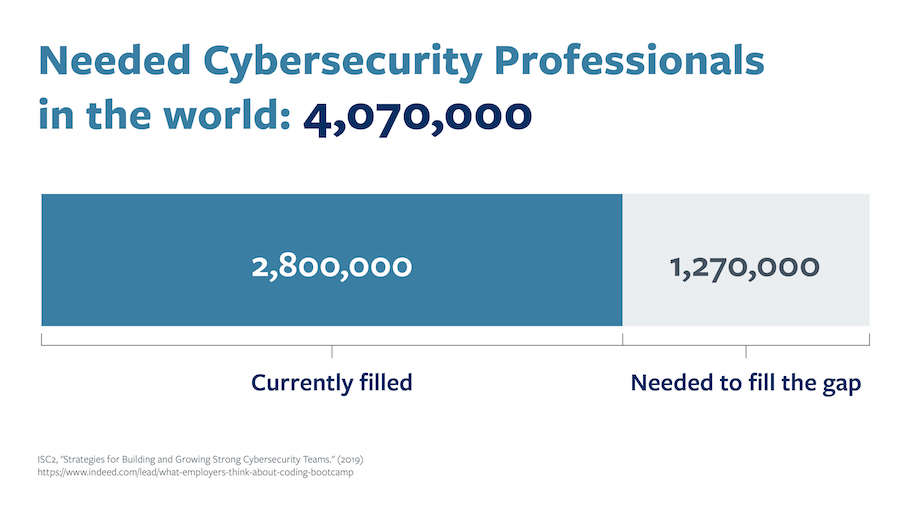Cybersecurity professionals serve as shields in the digital age — securing classified, proprietary and personal information from those who seek to steal or damage it. These professionals play offense and defense, building safe places to store data and foiling hackers by thinking and acting like them.
Ready to enter this exciting field? Let’s start with a closer look at five leading cybersecurity careers. We’ll also look at a few cybersecurity learning paths, including boot camp programs like the Berkeley Cybersecurity Boot Camp, where you can gain valuable industry skills.
Read on for an overview of the following cybersecurity careers list:
1. Information Security Analyst
Information security analysts protect a company’s entire body of data — from information stored in networks, to the printed ledgers and hard copies stored elsewhere. Analysts (including those in the cybersecurity sector) are projected to see a 31 percent employment growth rate through 2029.
Job Duties and Responsibilities
Information security analysts monitor their company’s networks for breaches and attacks, install and maintain security software, help develop disaster recovery plans and keep employees current on security procedures and software. This position also requires expertise in investigating attacks and reporting on the results. In cybersecurity, such tasks are imperative in keeping an organization’s digital network secure, with analysts working to mitigate cyberattacks while keeping infrastructure up-to-date where necessary.
Key Skills For Information Security Analysts
Information security analysts must exercise both firm protocol adherence and calmness in the face of potential crises. They should be forward-thinkers, preemptive organizers and clear communicators. In addition, analysts may supplement these skills with certification in their field. The Certified Information Systems Security Professional (CISSP) certificate, for example, is commonly recommended to security analysts. Aspiring analysts should also strive to gain prior experience in broad IT or network administration skills.

Ready to learn in-demand cybersecurity skills? Berkeley Cybersecurity Boot Camp offers a comprehensive curriculum that covers all of the fundamental concepts necessary to delve into the field.
2. Cybersecurity Information Technology Project Managers
Information technology project managers (including those overseeing cybersecurity initiatives) are responsible for planning and leading IT-based projects, managing project teams and acting as a liaison between the project’s business- and tech-oriented facets.
In cybersecurity, information technology project management is typically regarded as a high-level career and it is often populated with professionals who began as information security analysts or network administrators. CareerOneStop projects 6 percent employment growth for this field by 2029, with job opportunities expected to grow much faster than average.
Job Duties and Responsibilities
Cybersecurity IT project managers help oversee a company’s security profile, a role that includes establishing security policies and procedures and managing teams that implement them. Management, in this sense, may entail balancing a variety of security-based projects commonly aimed at fortifying existing network infrastructure, guarding against potential breaches and rectifying any outstanding flaws — all while keeping project teams apprised of IT security best practices and ensuring they are being followed. Managers might also be required to hire and train staff and set budgets.
Key Skills For Cybersecurity IT Managers
Cybersecurity IT project managers are consistently expected to possess strong attention to detail, solution-oriented thinking and high-level problem solving skills. These traits help managers maintain a keen eye on all network facets and drive them to quick, comprehensive action in times of crisis or setback. In turn, this sets a practical example for project teams, who must reflect such vigilance to ensure both success and internal cohesion.
What’s more, cybersecurity IT project managers must be proficient in all facets of computer security — from system design, to testing, to incident response — and must have several years of experience in these areas to advance. It is also important for managers to bring a continuous desire to learn, as they must remain informed on emerging threats and other relevant cybersecurity trends.
3. Network and Computer Systems Administrator
Network and computer systems administrators make sure a company’s computer systems run smoothly, are consistently available and remain free of security issues. This is one of the broader cybersecurity careers, but it often requires prior knowledge of security and digital forensics. In the U.S., the network and computer systems administration industry (including jobs rooted in cybersecurity) is projected to see an employment growth rate of 4 percent by 2029, according to the U.S. Bureau of Labor Statistics (BLS).
Job Duties and Responsibilities
Broadly speaking, network and computer systems administrators cover a lot of ground to meet a company’s tech needs. They configure and maintain systems, servers and cloud environments while offering operational support to meet daily system requirements. Administrators also work to troubleshoot and upgrade systems — particularly those that are dated. From a cybersecurity perspective, each of these tasks is crucial in keeping security infrastructure up to date, in line with security protocols and in compliance with risk management and data recovery protocols .
Key Skills for Network and Computer Systems Administrators
Since network and computer systems administration is a multifaceted role, those entering the field should be expert multitaskers, organizers and critical thinkers. They should be prepared to work with specific systems, such as Windows or Linux, or in cloud-based environments. Further, they should be familiar with security procedures, troubleshooting and recovery protocols. Aspiring administrators may also want to pursue certification in their field — such as the CompTIA A+ certification, which validates entry-level skills in the IT field.
4. Cybersecurity Web Architect
Web architects oversee the underlying design and implementation of digital networks, potentially including cybersecurity systems. This makes them instrumental in optimizing and maintaining an organization’s digital integrity. Currently, web architecture (including cybersecurity architecture) is an in-demand field, with a projected employment growth rate of 5 percent by 2029, according to the BLS.
Job Duties and Responsibilities
Cybersecurity web architects usually play a role in every level of an organization’s digital security — from systems design and implementation, to maintenance and supervision. Architects take the lead in constructing security systems and developing policies and procedures for properly maintaining secure computer networks. They also participate in the management and budgeting process, lead security teams and are integral in the development of corporate risk-assessment strategies.
Key Skills For Cybersecurity Web Architects
Web architects spend much of their time designing, planning and reporting on IT-related ideas, making foresight and critical thinking must-have, prerequisite skills for the role. In a cybersecurity sense, successful candidates often have experience as network administrators or in information technology. Job requirements may also warrant extensive knowledge of hardware and software design, several programming languages and information security. For particular industries, such as banking or finance, regulatory knowledge might be required as well.
5. Cybersecurity Software Developer
Software developers are responsible for designing, maintaining and updating a program or application. They also create crucial insights based on existing needs, user demands or internal flaws. Their contributions are critical, as these developers specifically build the IT systems that safeguard a digital entity’s information, including corporate websites housing sensitive employee or client data.
Cybersecurity software development is generally a more technical role — one that typically requires experience with several programming languages and automation processes. The BLS projects an above-average employment growth rate of 22 percent for all software developers (including those tasked with cybersecurity development).
Job Duties and Responsibilities
Cybersecurity software developers build systems that prevent attacks. They also create and install firewall and encryption software while conducting security assessments and testing for existing vulnerabilities. Developers essentially serve as the technical leads and expert contributors in their organization’s cybersecurity initiatives.
Key Skills For Cybersecurity Software Developers
Many software development positions seek individuals with proficiency in Python, a programming language common in both cybersecurity and machine learning. Otherwise, industry roles tend to be predicated upon continuous problem-solving abilities, intuitive design knowledge and general foresight into system deficiencies and potential updates.

Educational Pathways For Cybersecurity Jobs
Once you have chosen your desired cybersecurity career path and have aligned necessary prerequisites, the next step is to seek the necessary education. Cybersecurity roles are typically preceded by one of three effective educational pathways: bootcamps, traditional college degrees or self-guided learning options.
Bootcamps
Cybersecurity bootcamps offer the chance to learn industry fundamentals in a flexible, intensive and real-world-oriented environment. Online programs, such as the Berkeley Cybersecurity Boot Camp, provide learners with a series of modules covering everything from ethical hacking and penetration testing, to cybersecurity programming — skills that are commonly applicable to industry certifications including CompTIA Security+ and Linux+ (among others). Bootcamps also help learners create professional portfolios, which are key in demonstrating skills to prospective employers, as well as learning the soft skills necessary to succeed in the workplace.
Traditional Degrees
Traditional college degrees offer the chance to learn cybersecurity basics as part of broader technology fields. For example, aspiring cybersecurity professionals may enroll in major programs such as computer science, engineering or information technology management. Degree programs can be pursued both online and through brick-and-mortar campuses, offering their own form of flexibility and communal learning.
Self-Taught Options
Alternatively, self-guided cybersecurity learning options may benefit those wishing to learn independently. These options may include free online courses, educational apps or other resources rooted in unstructured, autonomous learning. They offer the chance to learn industry fundamentals while honing organization and time management skills.
FAQs
Is it worth pursuing a career in cybersecurity?
Absolutely. The number and variety of organizations hiring cybersecurity professionals makes this an employees’ market for those with the right skills. According to a recent MicroStrategy global survey, security ranks as the most important organizational need among analytics professionals.
Is a degree in cybersecurity worth it?
While employers occasionally look for a degree in fields such as computer science, information assurance or programming, college is not the only viable educational pathway for those seeking cybersecurity careers. For more information, here is a primer for those asking, “Is a degree in cybersecurity worth it?”
Can I enter the cybersecurity field without a degree?
Depending on the situation, it is possible to obtain a cybersecurity career without a degree. For example, those already working in a related role may be able to transfer their skills to a cybersecurity position. Meanwhile, options like cybersecurity bootcamps and certifications can provide the baseline knowledge to confidently pursue a career in the field. Specifically, entry-level positions are consistently available for roles like cybersecurity specialist, information security analyst and junior penetration tester.
However, candidates should realize that “no degree required” doesn’t also mean “no experience required.” Candidates need skills that employers value and certifications are one way to prove those skills. For more information, check out this guide discussing how to get into cybersecurity without a degree
What are the most in-demand cybersecurity skills?
Hackers are analytical problem-solvers sporting both creativity and attention to detail. These are the broad skills needed to work in cybersecurity, but the field also requires technical skills related to operating systems (e.g., Windows, Linux, macOS) and security frameworks (e.g., Kerberos, Splunk). Here is a closer look at the top cybersecurity skills to consider.
Do you need to know coding to work in cybersecurity?
Not necessarily. You can work in cybersecurity without writing much (if any) code. Instead, many jobs require knowledge of security software and systems, which is different from coding. Still, having some coding knowledge (particularly in Python) is a selling point and can help security professionals write programs to automate important tasks.
Do cybersecurity jobs run the risk of being automated away?
Artificial intelligence and machine learning are automating many tasks, including those hackers perform to search for network vulnerabilities. However, automated systems need humans to test their efficiency and guide their future learning. More importantly, cybersecurity professionals are vital in analyzing risk and helping businesses make critical decisions. As a result, the cybersecurity job market should continue to boom.
Ready to learn more about a future in cybersecurity? Consider making the Berkeley Cybersecurity Boot Camp your next step.
 Live Chat
Live Chat


